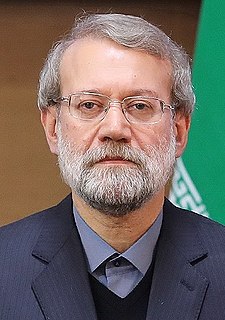A Quote by Mohammad Javad Zarif
Iran did not talk to the United States for 35 years. And now we are talking. And I believe these talks are useful. But they haven't produced the intended results. We have not seen an end to the hostility that has been exhibited in the United States against Iran. And I believe it is important that we see some of that.
Related Quotes
In the Islamic world, the U.S. is seen in two quite different ways. One view recognizes what an extraordinary country the U.S. is.The other view is of the official United States, the United States of armies and interventions. The United States that in 1953 overthrew the nationalist government of Mossadegh in Iran and brought back the shah. The United States that has been involved first in the Gulf War and then in the tremendously damaging sanctions against Iraqi civilians. The United States that is the supporter of Israel against the Palestinians.
I do believe that the very tense relationship between the United States and Iran presents a challenge to the United States. But to discuss Iran as that type of a threat I find somewhat unconvincing, mindful of the fact that Iran actually doesn't have those military capabilities that would be needed to refer to it as that type of threat.
It was not the United States who invaded Kuwait; it was Iraq. It was not the United States that went to war with Iran; it was Iraq. It was not the United States that fired chemical weapons at Iran; it was Iraq. And it was not the United States that murdered innocent Iraqi citizens with chemical weapons; it was Iraq.
We often forget that Iran has a long tradition and history with the United States. Iranians have been coming to the United States as students for decades. American businessmen were in Iran developing the oil fields. ...There was an American financial advisor to the Iranian government in the early part of the century.
Since 1981, after our nations severed diplomatic relations, we've worked through a international tribunal to resolve various claims between our countries. The United States and Iran are now settling a long-standing Iranian government claim against the United States government. Iran will be returned its own funds, including appropriate interest but much less than the amount Iran sought. With the nuclear deal done, prisoners released, the time was right to resolve this dispute as well.
In the United States, Iran is nothing but a whipping-boy. Few Americans have any real use for Iran. Most of us, what we know and remember about Iran are things like the hostage crisis in 1980, or they think about the Iranian attacks in Lebanon, or on the Khobar Towers. So you don't get a whole lot of political mileage in the United States by going out and advocating better relations with the Iranians.
I ask particularly that those of you who are now in school will prepare yourselves to bear the burden of leadership over the next 40 years here in the United States, and make sure that the United States - which I believe almost alone has maintained watch and ward for freedom - that the United States meet its responsibility. That is a wonderful challenge for us as a people.
The issue has two dimensions. One is the legal dimension and the other one is the issue at the realpolitik. [In the] legal realm, we believe in equal rights for all people in all nations. If Israel, the United States, Russia, Pakistan, other countries, China, have the right to have a nuclear program and nuclear bomb, Iran, too, must have that same right. Now, at the realm of realpolitik, because there is a global consensus against Iran, and because there are all manner of dangers facing Iran, I am opposed to this program.

































